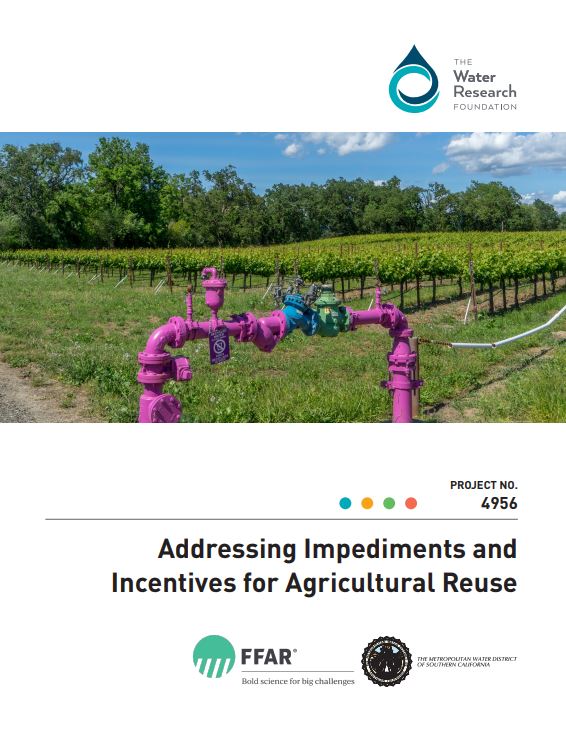Addressing Impediments and Incentives for Agricultural Reuse

Addressing Impediments and Incentives for Agricultural Reuse
View and download the report on the Water Research Foundation website here.
Overview
Water systems across the United States are facing unprecedented levels of stress arising from challenges, such as a changing climate, aging infrastructure, and shifting patterns of water supply and demand. Agricultural water reuse has the potential to increase the resilience of water and agricultural systems through benefits such as supply diversification, access to an additional water supply, nutrient management, and compliance with water quality permits. However, realization of these benefits and scaling reuse are hindered by broad ranging, but surmountable barriers and tradeoffs.
Led by the Pacific Institute, in partnership with the Water Research Foundation, this report, Addressing Impediments and Incentives for Agricultural Water Reuse provides practical, evidence-based guidance to help bridge the gap between the potential for agricultural water reuse and on-the-ground reality through the identification of proven strategies for advancing water reuse and overcoming barriers. The authors use a multifaceted approach, including literature reviews, synthesis research methods, and profiles of existing programs, to assess strategies for incentivizing and overcoming barriers to this practice. It focuses on the use of municipal recycled water for agricultural irrigation, offering practical strategies and recommendations. The report is intended as a resource for stakeholders, including regulators and water managers, to navigate the complexities of agricultural water reuse in diverse geographical and agricultural contexts across the U.S.
Led by the Pacific Institute, in partnership with the Water Research Foundation, this report, Addressing Impediments and Incentives for Agricultural Water Reuse provides practical, evidence-based guidance to help bridge the gap between the potential for agricultural water reuse and on-the-ground reality through the identification of proven strategies for advancing water reuse and overcoming barriers. The authors use a multifaceted approach, including literature reviews, synthesis research methods, and profiles of existing programs, to assess strategies for incentivizing and overcoming barriers to this practice. It focuses on the use of municipal recycled water for agricultural irrigation, offering practical strategies and recommendations. The report is intended as a resource for stakeholders, including regulators and water managers, to navigate the complexities of agricultural water reuse in diverse geographical and agricultural contexts across the U.S.
Key Takeaways
Key takeaways from the report include:
- Agricultural water reuse varies widely in terms of incentives, impediments, and opportunities.
- Successful projects often address multiple objectives, engage stakeholders early, are supported by appropriate regulations, and invest in innovation and partnerships.
- Scientific advances make it possible to better understand which constituents are in recycled water, but differences in study context and approaches make contextualization of realized human health and agronomic risks difficult.
- Additional research on the fate and transport of contaminants of emerging concern (CECs) (especially per- and polyfluoroalkyl substances (PFAS)) in agricultural systems irrigating with recycled water could help provide fuller insights into exposure and potential health, agronomic, and ecosystem risks posed by CECs in recycled water.
- Science advisory panels, interagency working groups, and basic research can help align regulations with the current best available knowledge.
- Additional investments in practical, stakeholder-vetted tools are needed to better support decision making in the face of uncertainty.
This work directly builds on the lessons learned in WRF 4775, Agricultural Use of Recycled Water: Impediments and Incentives, (Sheikh et al. 2019) and WRF 4829, Economic and Environmental Benefits of Agricultural Water Reuse (Thebo 2021). While the specific drivers and challenges of agricultural water reuse projects vary widely across contexts, several common themes emerged in this work.

